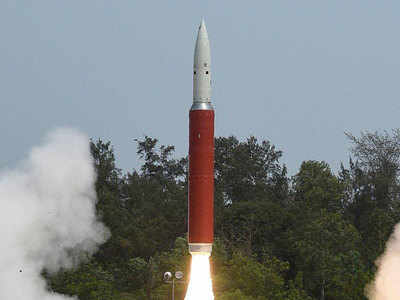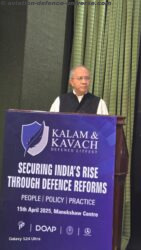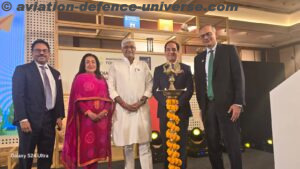
By Team ADU
- Pakistan in fear has given a long statement
- China & USA also respond
New Delhi. 29 March 2019. When on March 27, 2019 India conducted Mission Shakti, an anti-satellite missile test, from the Dr. A P J Abdul Kalam Island launch complex, little did India realise it was now in an enviable position and in the most elite club. But the neighbours both China and Pakistan are flabbergasted. India has suddenly got the military edge which has made them both uncomfortable.
Pakistan’s Foreign Ministry in an official statement said , “Indian anti – satellite Missile Test has raised concerns globally. Pakistan has been a strong proponent of Prevention of Arms Race in Outer Space. Space is the common heritage of mankind and every nation has the responsibility to avoid actions, which can lead to the militarization of this arena. We believe that there is a need to address gaps in the international space laws with a view to ensuring that no one threatens peaceful activities and applications of space technologies for socio-economic development.
We hope that countries which have in the past strongly condemned demonstration of similar capabilities by others will be prepared to work towards developing international instruments to prevent military threats relating to outer space. Boasting of such capabilities is reminiscent of Don Quixote’s tilting against windmills.”
The Chinese Foreign Ministry, in a written response to a question on India successfully test-firing an anti-satellite missile, said, “we have noticed reports and hope that each country will uphold peace and tranquility in outer space”.
The U.S claimed that its military’s early warning and surveillance network on Wednesday at 1:39AM EST detected India’s missile launch aimed at one of its own satellites in low Earth orbit. “We were aware,” said Lt. Gen. David D. Thompson, vice commander of Air Force Space Command.
Once the launch was detected, “we immediately started providing notification to satellite operators,” Thompson said on Wednesday during a hearing of the Senate Armed Services Committee’s subcommittee on strategic forces.
The significance of the test is that India has tested and successfully demonstrated its capability to interdict and intercept a satellite in outer space based on complete indigenous technology. With this test, India joins an exclusive group of space faring nations consisting of USA, Russia and China.
This was a technological mission carried out by DRDO. The satellite used in the mission was one of India’s existing satellites operating in lower orbit. The test was fully successful and achieved all parameters as per plans. The test required an extremely high degree of precision and technical capability. The satellite used was an Indian satellite.
The DRDO’s Ballistic Missile Defence interceptor was used, which is part of the ongoing ballistic missile defence programme. There are other ways to demonstrate ASAT capabilities such as “fly-by tests” and Jamming. This is a technology where we have developed capability. Space technologies are constantly evolving. We have used the technology that is appropriate to achieve the objectives set out in this mission. The test was done in the lower atmosphere to ensure that there is no space debris. Whatever debris that is generated will decay and fall back onto the earth within weeks.
The test was done to verify that India has the capability to safeguard our space assets. It is the Government of India’s responsibility to defend the country’s interests in outer space. The tests were done after we had acquired the required degree of confidence to ensure its success, and reflects the intention of the government to enhance India’s national security. India has seen an accelerated space development programme since 2014.
India has no intention of entering into an arms race in outer space. We have always maintained that space must be used only for peaceful purposes. “We are against the weaponization of Outer Space and support international efforts to reinforce the safety and security of space based assets. India believes that Outer space is the common heritage of humankind and it is the responsibility of all space-faring nations to preserve and promote the benefits flowing from advances made in space technology and its applications for all, ” says a Gobernment of India, Ministry of External Affairs statement.
India is a party to all the major international treaties relating to Outer Space. India already implements a number of Transparency and Confidence Building Measures(TCBMs) – including registering space objects with the UN register, prelaunch notifications, measures in harmony with the UN Space Mitigation Guidelines, participation in Inter Agency Space Debris Coordination (IADC) activities with regard to space debris management, undertaking SOPA (Space Object Proximity Awareness and COLA (Collision Avoidance) Analysis and numerous international cooperation activities, including hosting the UN affiliated Centre for Space and Science Technology Education in Asia and Pacific. India has been participating in all sessions of the UN Committee on the Peaceful Uses of Outer Space.
India supported UNGA resolution 69/32 on No First Placement of Weapons on Outer Space. We see the No First Placement of weapons in outer space as only an interim step and not a substitute for concluding substantive legal measures to ensure the prevention of an arms race in outer space, which should continue to be a priority for the international community.
India supports the substantive consideration of the issue of Prevention of an Arms Race in Outer Space (PAROS) in the Conference on Disarmament where it has been on the agenda since 1982. The principal international Treaty on space is the 1967 Outer Space Treaty. India is a signatory to this treaty, and ratified it in 1982. The Outer Space Treaty prohibits only weapons of mass destruction in outer space, not ordinary weapons.
India expects to play a role in the future in the drafting of international law on prevention of an arms race in outer space including inter alia on the prevention of the placement of weapons in outer space in its capacity as a major space faring nation with proven space technology. India is not in violation of any international law or Treaty to which it is a Party or any national obligation.
The test is not directed against any country. India’s space capabilities do not threaten any country and nor are they directed against anyone.At the same time, the government is committed to ensuring the country’s national security interests and is alert to threats from emerging technologies. The capability achieved through the Anti-Satellite missile test provides credible deterrence against threats to our growing space-based assets from long range missiles, and proliferation in the types and numbers of missiles.
US also had another issue . Acting U.S. Defense Secretary Patrick Shanahan warned any nations contemplating anti-satellite (ASAT) weapons tests like the one India carried out on Wednesday that they risk making a “mess” in space because of debris fields they can leave behind.
Speaking to reporters in Florida during a visit to the US military’s Southern Command, Shanahan said the United States was still studying the outcome of a missile India said it launched at one of its own satellites.
“My message would be: We all live in space, let’s not make it a mess. Space should be a place where we can conduct business. Space is a place where people should have the freedom to operate,” Shanahan said. US ofcourse is worried about the debris in space caused by such a test.
Indian Prime Minister Narendra Modi announced the ASAT test in a least when expected national address on Wednesday, saying India had “established itself as a global space power”.
Arms control advocates fear that the increasing militarisation of space due to this ASAT technology acquired by India would allow India to take out the satellites of enemy powers in any conflict either or both China and Pakistan in case of future wars if any.


































































































































